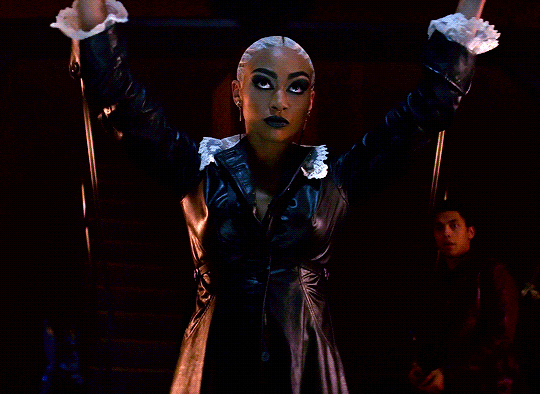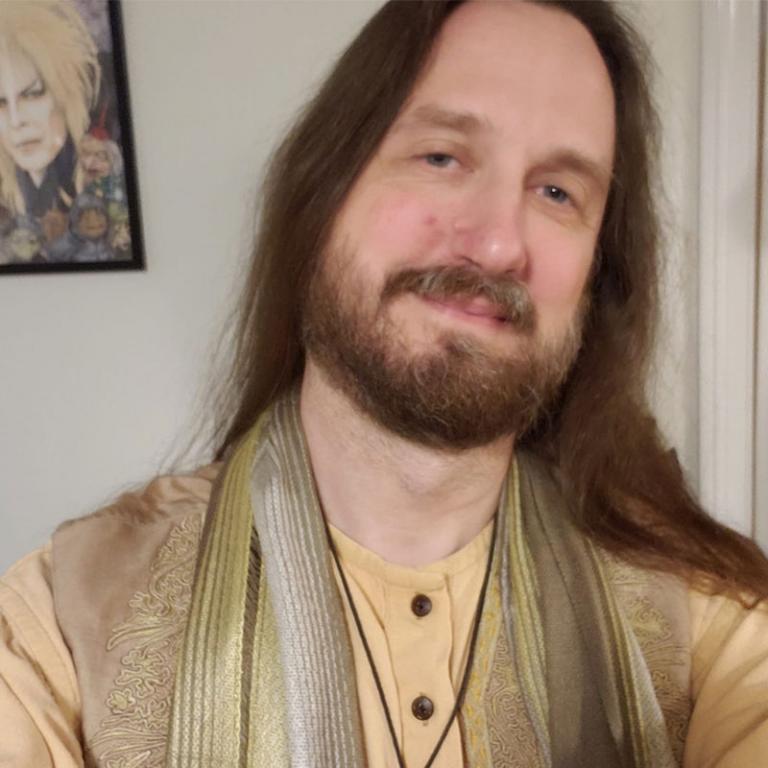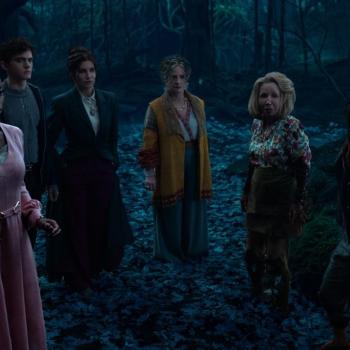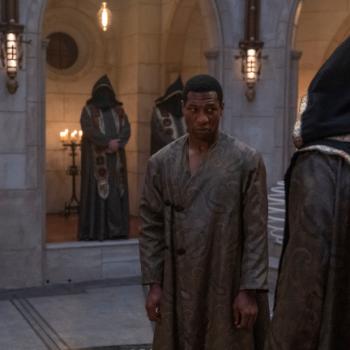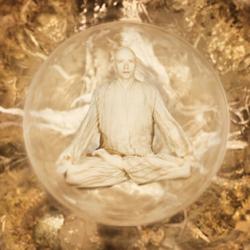Warning: Contains some spoilers for the final season of “The Chilling Adventures of Sabrina.”
In the final season of “The Chilling Adventures of Sabrina,” released this past New Year’s Eve on Netflix, Sabrina and her coven must face and defeat eight vaguely Lovecraftian “Eldritch Terrors” (roughly one per episode). These terrors aren’t necessarily villains per se, but primal entities intent on sowing chaos and destruction, that sometimes manifest as physical beings and in other cases, as non-corporeal entities, such as “the Void” which is the ultimate foe at the end of the series. All of this was set up early in the previous season, as the always power hungry Faustus Blackwood (Richard Coyle) sought to harness these otherworldly powers, which were contained in an egg Blackwood procures in Loch Ness, from the hands of a particularly Lovecraftian fish-like demon.

And while some of these “terrors” pay slight homage to Lovecraft, such as “the Weird,” a squid-like being that takes over Sabrina’s consciousness, most of the terrors don’t come from Lovecraft at all. I was particularly struck by the terror introduced in the 4th episode of the season, “the Imp of the Perverse,” written by Christianne Hedtke and directed by Antonio Negret.
Fake Empire
In the episode, the Imp of the Perverse is essentially a macguffin, an idol that Blackwood obtains from an odd trinket salesman (James Urbaniak), who returns later in the season, but who is never explained (though there are theories). In plot function, the Imp is basically a Monkey’s Paw situation, just as in “Wonder Woman 1984,” which I wrote about last week.
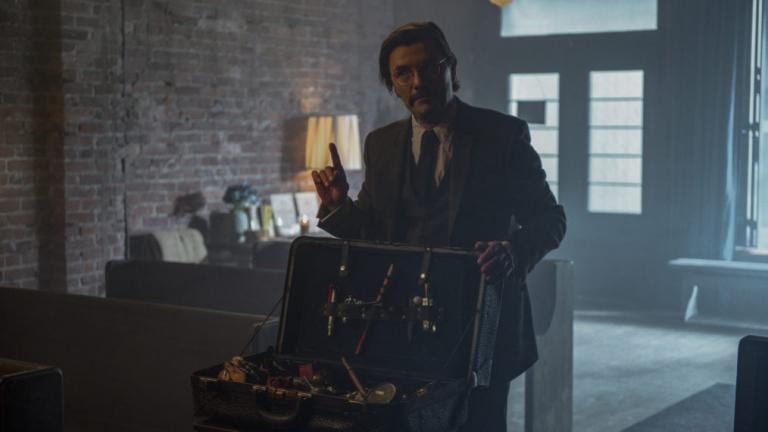
However, the episode doesn’t explore the moral implications of using the Imp, as most Monkey’s Paw stories do, but rather, presents the challenges of navigating a reality “perverted” by the imp. In fact, the episode basically fits the standard of the “alternate reality” trope so common to genre shows. More specifically, this a fascist alternate reality (also, a “villain world” trope), similar to, say the Dark Mirror universe in “Star Trek” so recently revisited in “Star Trek: Discovery.”
The alternate reality created by the Imp of the Perverse makes for an episode that both reframes how witchcraft is presented on the show, creating a more overt political context for magickal identity, but also examines a psychological urge for chaotic power in its villain that mirrors the political moment in which America currently finds itself.
Of course, since Blackwood early on in the show establishes himself as a misogynistic narcissist hellbent (literally) on ultimate power and control, it’s no surprise that his wish on the Imp is to be emperor, retroactively. But in true Monkey’s Paw fashion, the catch is that he’s only emperor of Greendale, the small New England town where the show is set. And everyone in the town only remembers the perverted reality, except for Sabrina and Roz (one of the show’s many plot conveniences – they already had contact with eldritch terrors – whatever). But that spell only holds within the borders of the town.

Our heroines’ main task is to convince the others living in this reality that it indeed is not real. This makes for dangerous interactions between Sabrina and her Aunt Zelda, who has to at least put on a show of loyalty to Blackwood, and between Roz and Harvey, who has essentially become one of Blackwood’s Nazi youth.
Back in season 2, we had seen Blackwood’s institutional tendency towards misogyny and race supremacy with his Judas Society, an all male boys club in the Church of Night, that held that mortals were a scourge to be exterminated and witches were meant to serve warlocks.
However, due to Blackwood’s character developments since then, in which he was expelled from the Church of Night and rejected by Satan himself, he is here waging war on the magickal community as a whole, recruiting the mortal world to his cause, and outlawing witchcraft. The world he creates includes obviously fascist themed uniforms, Nazi-adjacent songs (“Tomorrow Belongs to Me” from Cabaret plays a significant role in a scene that functions as a test of fealty), and ubiquitous propaganda.

Once we’re in the alternative universe, we have a scene where Blackwood shows up at Baxter High, the mortal school, where Roz and Sabrina are incognito after the latter realizes she’s public enemy number one. Blackwood and Ms. Wardwell (Michelle Gomez) instruct the students on the dangers of witchcraft and we see Sabrina react with some confusion as the seasoned magickal practitioner Blackwood knowingly spouts anti-witch propaganda (“they ride above us on their broomsticks, dropping spell bombs!” “They eat babies!!”).
Blackwood clearly abhors difference and has Robin (who we know is the “hobgoblin” Puck) arrested for witchcraft because of his green hair and pointy ears, but then switches to his boyfriend, Theo Putnam (Lachlan Watson) when he defends him. And in a clear indication of the true ethos of the show, even the evil villain who wants to rule and/or destroy humanity doesn’t misgender the trans character (Theo identifies as male, whereas the actor identifies as non-binary and uses they/them pronouns).
But overall, we get to see how thoroughly Blackwood’s fascism has taken over the world of Greendale. This is especially striking in the character of the always brave and loyal Harvey Kinkle (Ross Lynch). His bedroom, usually a geek haven, with comic book, horror movie and music posters, is now covered with Blackwood propaganda. His girlfriend Rosalind, or Roz (Jaz Sinclair), unaffected by the spell, tries to reach him to no avail.

The dynamic between Roz and Harvey is particularly fraught, as we just learned in the previous episode (“The Weird”) that Roz isn’t just a cunning woman as she was led to believe from her deceased grandmother, but an actual witch. Perhaps a bit of a ret-con, a scene in that episode smartly explains the politics of a Black woman from an older time hiding her witchcraft under an identity acceptable to the Christian community.
Immediately, Harvey is distraught by this information, as he dated Sabrina at the beginning of the show but split with her after he realizes she’s a witch. In fact, one of the many plot points that the show raised and completely dropped from its earlier seasons was that Harvey is from a long line of witch hunters and his bias may in fact be generational. I found it odd that this was a major thing early in the show but never again mentioned, not even in an episode like this where it would have been pretty darn relevant. Regardless, this conflict is hanging over the characters’ heads even before they enter the alternative reality. And to his credit, Harvey does eventually come through, even with the spell.
Ultimately, the episode follows a familiar trajectory where our heroines discover that there is a “French resistance” of witches, hiding behind the shop run by Hilda and Dr. Cerberus. Visual cues, such as colors and costumes (Lilith’s beret!) hammer that association home. Blackwood leaves a “witch’s mark” on households accused of witchcraft, evoking the yellow star that the Nazis left on Jewish homes. We eventually get a witch trial scene straight out of the movies, complete with references to historical Salem as Sabrina’s lovesick former boyfriend Nick is tortured into confessing (“More weight!”).
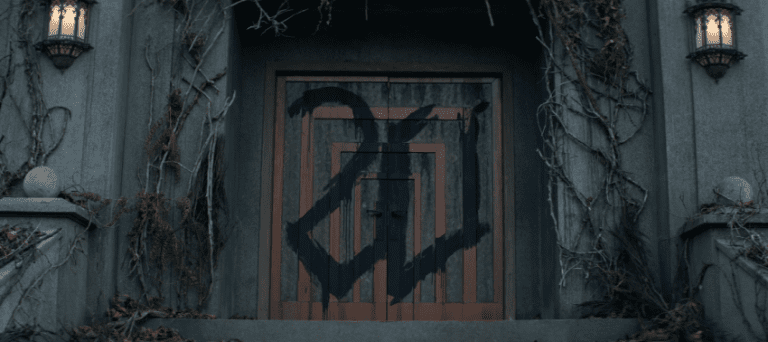
In these fraught, divisive times…
Beyond just a Nazi allegory, the episode is also trying to say something about current politics and what it means to claim witchcraft as an identity. And while I don’t imagine that the show writers necessarily had the actual witchcraft community in mind, the allegory works just as well when taken literally.
The opening scene of the episode is Sabrina (Kiernan Shipka) rehearsing a speech where she is running for student council co-president with Roz, in front of her family. One of the first lines is “in these fraught, divisive times…”. She uses buzz words that eerily echo (pre-figure, since this was filmed in late 2019) Joe Biden’s recent speeches: empathy, unity, inclusivity, voice. The speech is so vague that we don’t really know what she’s talking about, but we know EXACTLY what she’s talking about.
And while her family heartily applauds her, the ever pragmatic Zelda (Miranda Otto) skeptically tells Sabrina: “I sensed a lack of authenticity and identity behind your words.” This seems to be resolved by the end of the episode, when after their adventures, Sabrina and Roz decide to run their candidacy transparently as out and open witches.
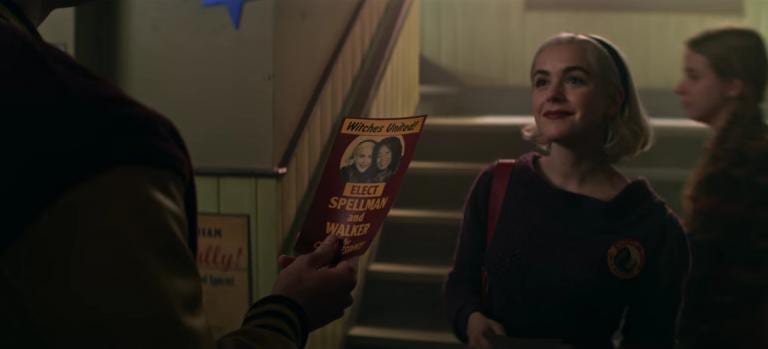
Sabrina’s final speech is worth noting in its entirety. When asked what their flyer, that says “witches united” means, she proclaims: “It means we are powerful, disruptive women. Champions of the oppressed. Supporters of the othered. Unapologetic feminists. Allies to all those who live in the shadow of the patriarchy. Reminders that the shadow has its own power. We will speak the truth and we will fight injustice.”
While in the context of the show, the speech is kind of eye-rollingly earnest, taken as a whole, I can’t imagine a better description of activist witchcraft.
And it’s hard not to be reminded, for better or worse, of Joe Biden and Kamala Harris as Sabrina and Roz raise their held hands to proclaim that they will be next Presidents of the student council.
Yet that solidarity isn’t unearned. During the episode, after Ambrose leaves town and finds that he remembers the true reality, he encounters the Trinket Man who conveniently gives him, for free no less, the Stone of Omphalos which, while a real artifact, in the show universe, allows the witches to re-establish reality.
Hilda (Lucy Davis) determines that she can spread the stone’s reality re-setting magic to more people by creating a literal “stone soup” to bring back the coven’s memories. Of course, the scene evokes the folk story of stone soup, in which villagers are encouraged to share their resources to feed everyone (Oh no! Socialism!). And it’s worth noting that actual stone soup was both a thing during the Depression and it’s a pretty clear example of practical, sympathetic magic!
When Zelda regains her memories, she gives a passionate speech about how the coven had been asleep and how Blackwood had used his powers to keep the witches “confused and weak, so he could control us!” She vows revenge, reshaping the old Biblical epithet: “We shall not suffer Blackwood to live!” And, of course, in true Gen Z fashion, Sabrina later distills all this down to them being “woke witches.”
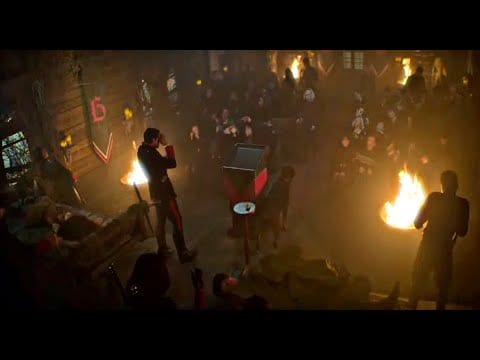
Accordingly, in the climactic scene during the witch trials, Sabrina publicly claims that identity, standing up and shouting “I, Sabrina Spellman, born of a mortal woman and the Dark Lord Satan himself, proudly proclaim myself a witch!” Indeed, Sabrina’s proclamation is a powerful act in a fascist society. And it is at this point that the previously incognito witches rise up together to defeat Blackwood, in an overthrow of the patriarchy reminiscent of (but not quite as grand a scale as) Buffy’s high school army fighting the mayor in “Graduation Day.”
The Power of Perversity
And this brings us back to Blackwood himself. Never really more than a two-dimensional villain on the show, dutifully fulfilling the antagonist role wherever the writers choose to place him, with little motivation other than power, he basically functions as a stand-in for the patriarchy. After he loses his position in the Church of Night, and even in alternate realities, Sabrina can’t help but call him “Father Blackwood.” He’s actually had the devil inside him (make of that what you will) but even the obnoxious portrayal of the mostly impotent Lucifer on the show (Luke Cook), who Blackwood initially wants to model himself after, pales in comparison to the depths of Blackwood’s misogyny.
His name, Faustus Blackwood, in the show’s usual clever method of occultural references, evokes both the magus of the Renaissance stage and the prolific British ghost story writer, Algernon Blackwood. In the final season, as the characters deal with the Eldritch Terrors, the show revels in Lovecraftian references galore, and Blackwood himself takes on the persona of Reverend Lovecraft, just as his character look perfectly emulates the early 20th century author who has received such renewed attention lately, thanks to the amazing “Lovecraft Country.” And of course, much of that recent attention is due to Lovecraft’s virulent racism, which “The Chilling Adventures” hints at with Blackwood’s character, especially with his initial interracial marriage and mixed race children, who he sees as little more than cannon fodder.
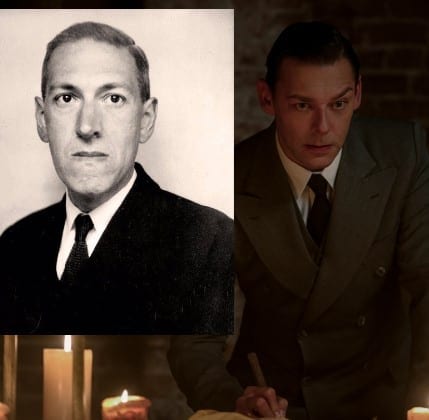
And again, returning to the motifs of the show’s final season, the Lovecraftian notion of “Eldritch Terrors” centers on the horror of the incomprehensible, of humanity’s insignificance against the indescribable nature of the otherworldly. This was a recurring theme in Lovecraft’s work, so much so that one of his most well known anthologies was “Eldritch Tales.” And these ideas pervade modern genre works in science fiction, fantasy, and horror. They’re everywhere (if you’d like to hear more about the occultism of Lovecraftian horror, specifically in relation to “Lovecraft Country,” check out the most recent episode of my YouTube show with Lilith Dorsey, Pop Occulture!).
However, the Imp of the Perverse does not come from Lovecraft, but from one of his influences, Edgar Allen Poe. “The Imp of the Perverse,” is an odd, brief piece by Poe, published in 1845, that is both essay and short story. It transitions from an exploration of primal fears and psychoses with practically impenetrable language (though with references to occult concepts, like the Kabbalah), to a first person narrative of a murderer who has inexplicably confessed to his crime and awaits execution in his jail cell.
In the piece, the “Imp” is not an object at all, but rather a psychological urging that compels a person to commit acts that are wantonly self-destructive, akin to the sensation of standing on a precipice and imagining throwing yourself off the edge. I’ve certainly had those moments, like imagining what would happen if I jumped onto the tracks of an oncoming train and it’s not even suicidal ideation. Apparently, this is a normal thing.
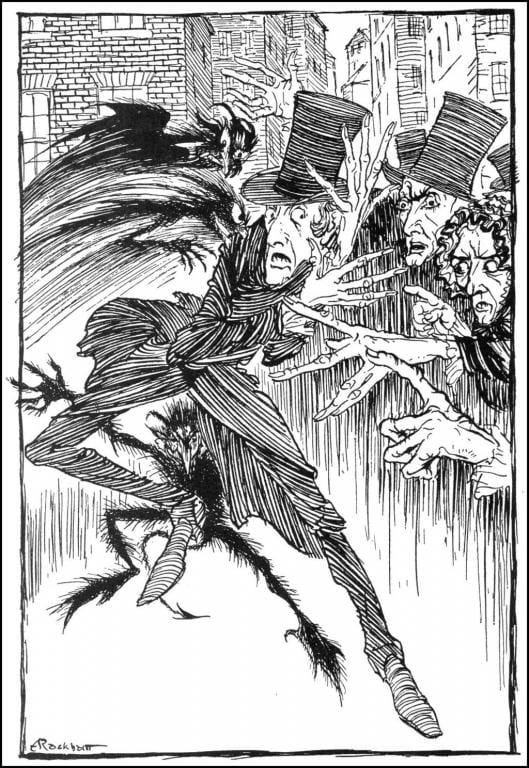
And strangely enough, in the story, it’s not the murder itself that is the impulsive, illogical, unexplainable act – it’s the urge to confession. It’s not necessarily about the urge one might have to do evil to others, which is often a misinterpretation of the imp concept. Rather, it’s that compulsion to put oneself in danger even when one is perfectly safe. In some cases, Poe’s character explains, this “perversity” manifests as potentially damaging procrastination, a concept to which all writers can intimately relate.
In other cases, it goes further. As Poe describes it, “There is no passion in nature so demoniacally impatient, as that of him who, shuddering upon the edge of a precipice, thus meditates a Plunge. To indulge, for a moment, in any attempt at thought, is to be inevitably lost; for reflection but urges us to forbear, and therefore it is, I say, that we cannot. If there be no friendly arm to check us, or if we fail in a sudden effort to prostrate ourselves backward from the abyss, we plunge, and are destroyed.”
Why do we do these things? Why would Blackwood invoke the Eldritch Terrors knowing they would bring about the destruction of all existence? He goes through a lot of trouble in season three to create a 15 year time bubble to study and train to wield their power, to become the priest of the beyond. He says he wants to harness their power, but that doesn’t really make sense. He fully knows he can’t control the power and the whole endeavor is literal madness.

Perhaps Blackwood’s goal is to fully embrace chaos. Ironic then, that his power fantasy in the “Imp of the Perverse” is one that is completely steeped in fascistic order. Perhaps chaos and order are two sides of the same coin when it comes to patriarchal, white supremacist power.
Take Back Reality
We see that now. As I’m writing this, the nation is reeling from an unprecedented insurrection attempt in which Trump cultists breached security and broke into the Capitol building, violating its chambers, all egged on by the so-called President. Many of us are wondering about the possible complicity of certain aspects of law enforcement that allowed this to happen. How did we get to this moment?
Watching this episode reminds me of how someone like Trump casts magical spells of a sort with his own “Imp of the Perverse.” We are currently living in a moment in which a charismatic, narcissistic leader with fascist tendencies has essentially created an alternate reality in which he is the sole authority, one who would never do anything as weak as lose an election. Indeed, it’s an alternative reality in which the followers of this autocrat are utterly under his spell and subscribe to that reality, willing to take up arms to defend it. Are we living in someone’s alternative reality, wished upon an imp?
We’ve had “woke witches” casting spells against Trump since 2016. We have rejected him at the voting booth. What will it take to fully dispel the evil? At the end of “The Chilling Adventures of Sabrina,” Blackwood cannot be killed because he has the Mark of Cain, but his daughter, the unapologetic Prudence (Tati Gabrielle) determines to dismember him (with a handy chainsaw) and forever keep him from influencing things again. Trumpism will likely not die, but perhaps we can dissipate it somewhat.
Or perhaps we need more Black witches with swords and chainsaws.
